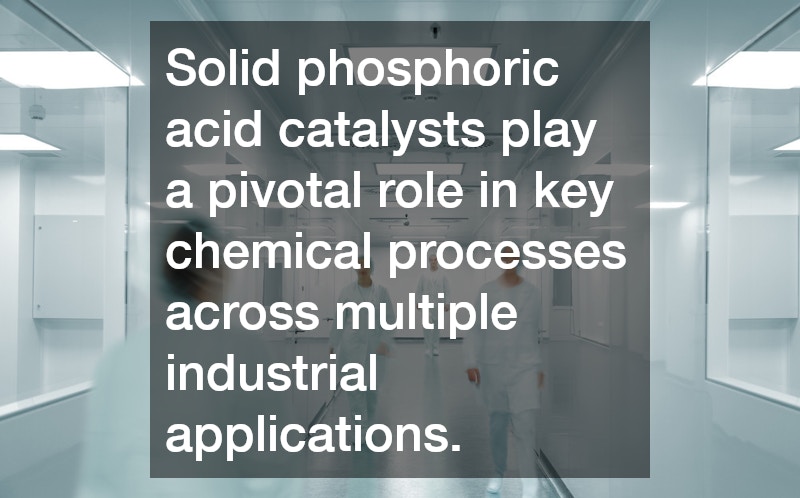Solid phosphoric acid catalysts have long been a cornerstone in the field of industrial chemistry, facilitating numerous chemical reactions that form the backbone of various manufacturing processes. These catalysts are composed primarily of phosphoric acid supported on an inert carrier material, which enhances their stability and reactivity. This article aims to provide an in-depth exploration of the key applications for solid phosphoric acid catalysts, highlighting their crucial role in industrial production and their significance in the modern chemical industry.
Application in Alkene Production
One of the primary applications of solid phosphoric acid catalysts is in the production of alkenes, which are critical components in the synthesis of various chemicals and polymers. Their catalytic properties enhance the yield and efficiency of dehydrohalogenation reactions, which are essential for producing ethylene and propylene. Ethylene, often referred to as the “building block of the chemical industry,” underscores the significance of such catalysts for industrial-scale production.
In addition, the ability of solid phosphoric acid catalysts to facilitate the selective production of specific alkenes provides manufacturers with greater flexibility in tailoring outputs to market demands. This adaptability is crucial in industries such as plastics, where demand for polymers like polyethylene dictates production processes. High selectivity also means reduced byproduct formation, which aligns with current industrial trends toward more sustainable and less wasteful chemical processing.
By contributing to efficient alkene production, solid phosphoric acid catalysts not only bolster the associated supply chains but also support global industries reliant on derived materials. From packaging to automotive components, the widespread applications of alkenes underscore the broad impact of these specialized catalysts. This proliferation of uses ensures that the demand for solid phosphoric acid catalysts remains strong in various sectors.
Role in Cumene Production
Cumene, also known as isopropylbenzene, is an essential precursor in the production of phenol and acetone, and solid phosphoric acid catalysts are extensively used in its manufacturing. These catalysts enable the alkylation reaction of benzene with propylene, resulting in cumene through efficient and environmentally friendly processes. The efficiency of this conversion process, driven by solid phosphoric acid catalysts, sustains high production volumes necessary for meeting global demand.
The production of cumene is crucial for the synthesis of various chemical derivatives used in the manufacturing of plastics, fibers, and other industrial materials. By utilizing solid phosphoric acid catalysts, chemical plants can optimize processes to achieve higher throughput with minimal waste production, enhancing overall profitability. This optimization is supported by the catalyst’s long activity life, which reduces operational costs and downtime associated with frequent catalyst renewals.
The integration of solid phosphoric acid catalysts in cumene production illustrates the confluence of industrial efficiency and environmental consciousness. Their application not only yields economic benefits but also aligns with the global shift towards more sustainable chemical processes. The resulting compounds derived from cumene find applications across diverse sectors, amplifying the catalysts’ impact in industrial applications worldwide.
Significance in Isomerization Processes
Solid phosphoric acid catalysts are crucial in facilitating isomerization reactions in the chemical industry, particularly within the petrochemical sector. These processes are vital for converting linear compounds into branched isomers, which often exhibit superior chemical properties desired in end products. The application of these catalysts in isomerization enhances fuel quality through the production of high-octane gasoline components.
In addition to their role in fuel optimization, solid phosphoric acid catalysts are key in generating various isomers crucial for the production of pharmaceuticals and agrochemicals. The selective isomerization enabled by these catalysts allows for increased versatility in synthesis pathways, culminating in tailored end products. This selective conversion of hydrocarbons not only improves material properties but also optimizes resource use, presenting clear economic advantages.
The versatility and efficiency of solid phosphoric acid catalysts in isomerization processes reflect their broader importance in chemical manufacturing. Their capability to drive reactions toward desired products enhances sustainability and economic viability, highlighting their value. As industry benchmarks evolve, these catalysts remain central to achieving higher standards in product quality and environmental stewardship.
Solid phosphoric acid catalysts play a pivotal role in key chemical processes across multiple industrial applications. From enhancing the production of alkenes to optimizing cumene and isomerization processes, their impact is both profound and far-reaching. Their utility in creating high-demand chemical intermediates showcases their essential contribution to the chemical industry’s advancements.
.


